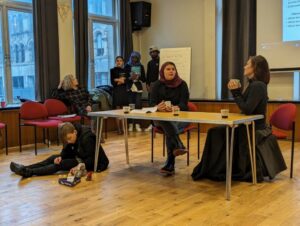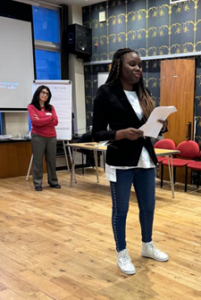As part of the research project on care, inequalities and wellbeing among transnational families, the research team ran a series of participatory feedback workshops with transnational families in England who participated in the research. We wanted to share key messages from the study with participants and invite them to provide further feedback through using participatory theatre, facilitated by Rank and File Theatre.
The workshop that took place in Manchester in January 2024 was attended by participants from refugee and other migrant backgrounds, researchers, and project workers from Migrant Support, as well as actors from Rank & File Theatre who have lived experience of migration.
The experiences of family participants were condensed into a story about a fictional character, Aisha and her family’s difficulties caring for each other across borders under forced separation. Through a series of five actions, performed by Rank & File, we saw struggles with caring for young children with additional needs, language barriers, access to health care, qualifications being unrecognised in the UK, the inability to care for siblings across borders who do not have leave to remain, and the stress experienced when overseas elderly relatives suffer health problems, cannot afford phone credit and systems in place hinder family reunification.

Before travelling up to Manchester, Rank & File developed a scene for each action. An actor from Rank & File Theatre commented on the process:
“Since working with Rank & File, I have begun to see theatre in a completely different light than when I was a kid. It is a way of living that brings people together to connect in ways that cannot always be reached in everyday convention. I just love it. Thank you. Thank you so, so much for helping me realise this.” – Actor from Rank & File Theatre.
The actions were then performed at the workshop using Baol’s Theatre of the Oppressed approach. This not only allowed the findings to be communicated in an accessible and engaging way, but crucially it gave the audience the power to stop the actors and alter the choices being made, with view to exploring solutions to any oppression featured within the performance. These alternative choices provoked engaging and dynamic conversations between those with lived experience in the audience and on stage through dialogue, exchange, improvisation and interventions, generating humour and poignancy in equal measure.
In one example, participants highlighted that collecting the required documents for family reunification is difficult. Alternatively, people could be supported by reintroducing access to legal support, which has undergone drastic cuts in recent years. Project workers from Migrant Support similarly emphasised that as much as they want to help, there is little they can do in a hostile environment that is slow to respond and makes gaining any form of status hard.
It was a humbling experience. The workshop provided the space for participants to share their stories. Hearing of the continuous, drawn-out process of waiting to be granted the Right to Remain by one participant and its battering effect on their mental health was moving, and sadly all too familiar. This in turn inspired Elizabeth, a member of Rank & File, to share a poem she wrote on her difficulties of seeking asylum and being granted refugee status called “Four Years”.

“In a shattered world like ours anyone can be a refugee. Having worked with Rank & File since 2021 and then being abruptly moved by the Home Office to a hotel in Kent in 2022, it means the world to me to raise awareness of the issues we are facing, most often in isolation, and to challenge our policy makers for different outcomes. It was amazing to see everyone in Manchester, sharing the stories that unite us and the journey of where I started from to where I am today” – Actor from Rank & File Theatre.
Imagining alternative futures in the theatre workshop was exciting, if a little funny at times. Sending a phone to Aisha’s elderly parents led to a much-needed video call, and our actors shouting their best wishes across the room!
At the end, there was an opportunity to provide feedback on the workshop and get into deeper conversations with all attendees. Anonymous post-it notes as part of the evaluation feedback on the workshop showed how the workshop helped bring to light the difficulties faced by transnational families, but it also showed how, as one participant said, “together we are stronger”.
Actors from Rank & File Theatre commented: “Thank you all for a wonderful day out advocating for our rights. Thank you all so very, very much” – Actor from Rank & File Theatre.
“Thanks to the whole team. It is valuable and important for me to be together in the implementation of the necessary topics for society with the tools of the theatre. Thank you for your attention and communication […], it is very valuable for me (because I myself cannot cope without being surrounded by beautiful people. Because people 12 years old listen to other people more. They study, learn the laws of the world and light). I really want to create the necessary projects for the world and people” – Actor from Rank & File Theatre.
Following the workshop in Manchester, and other workshops in Reading and Leeds, Rank & File actors were filmed replaying the actions at University of Reading Film Studios, along with reworked versions to show what more supportive responses from statutory service providers could look like. The films will be shared with policymakers and project workers and made available on YouTube.
We thank Ruth Evans, Rosa Mas Giralt, Migrant Support and the Transnational Families Research team at The University of Reading.
Written by Hannah & Jude from Rank & File Theatre.


